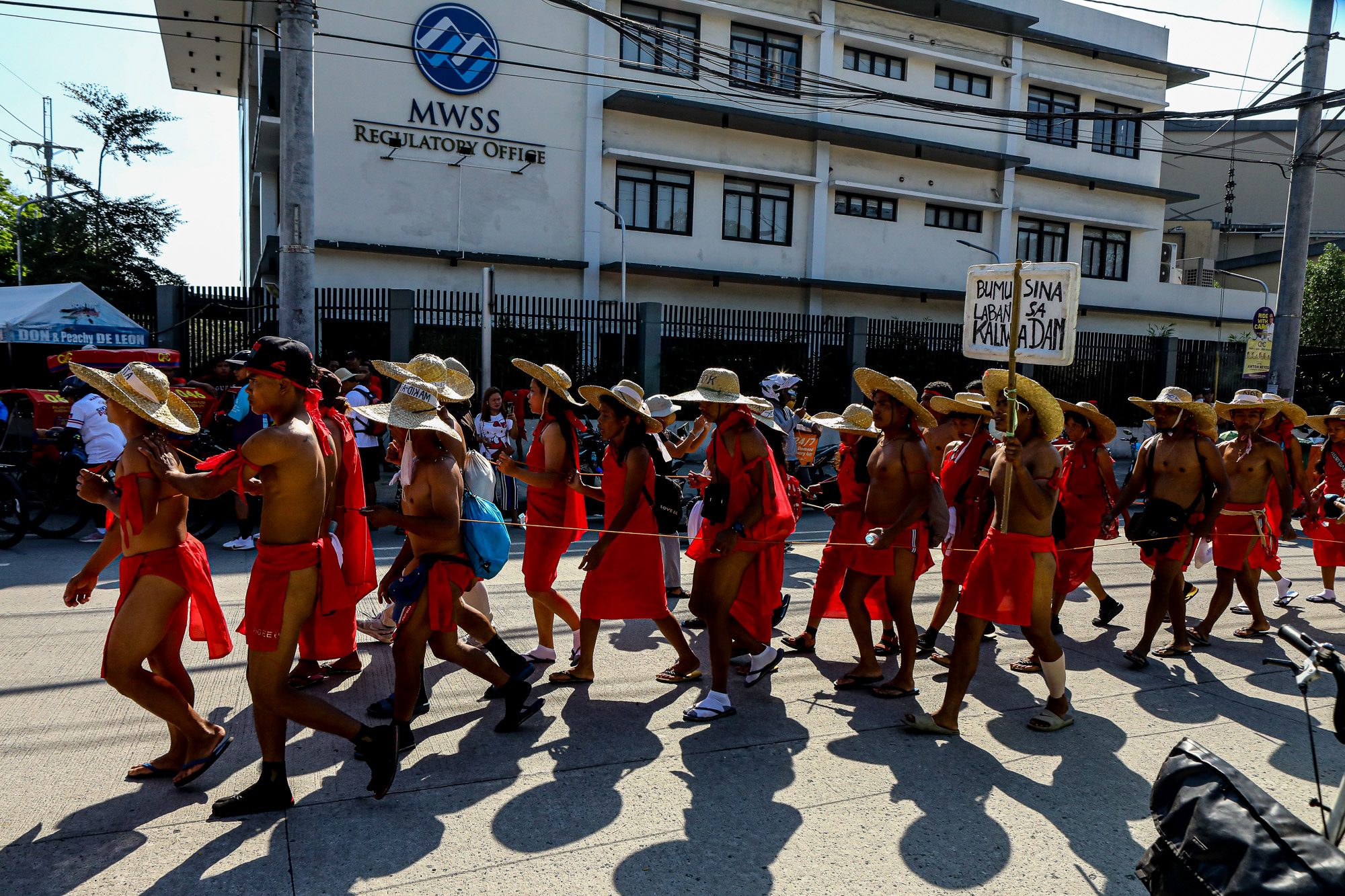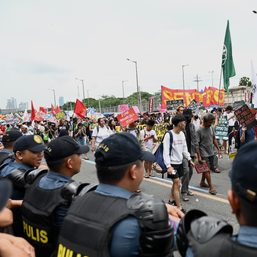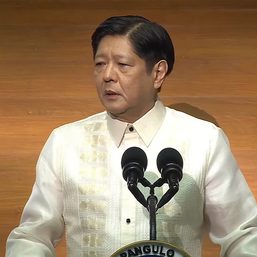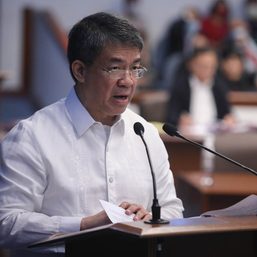SUMMARY
This is AI generated summarization, which may have errors. For context, always refer to the full article.

MANILA, Philippines – Every State of the Nation Address (SONA), regardless of who the president is, politicians parade the Batasang Pambansa red carpet garbed in tribal ensembles. But indigenous peoples (IP) groups have said they still feel underrepresented and neglected in conversations regarding national affairs.
Decrying violent government policies endangering IPs, indigenous women representatives called for the recognition of indigenous rights in President Ferdinand Marcos Jr.’s second SONA, which he is poised to deliver on Monday, July 24.
In an interview with Rappler on Saturday, July 22, Tessie Ambol, an indigenous human rights defender from the Lambangian tribe of Maguindanao said IPs are often left out of national discourse.
“Kaya patuloy din po iyong pagstru-struggle po ng mga IP sa mga karapatan po namin, lalo na kaming mga kababaihan ng Lambangian, hirap din kami dahil sa mga pangyayari na hanggang sa kasalukuyan ay wala pong kalutasan,” she said.
(That’s why we continue to struggle with our rights, especially us, the women of Lambangian. We are also having a hard time because of the issues still left unresolved until now.)
In a 2022 statement released after Marcos’ first SONA, LILAK Purple Action for Indigenous Women’s Rights said there was “not a single mention of indigenous peoples” in his speech. They added his economic plans to generate corporate and foreign investments “had harmed indigenous peoples, led to their killings and violence against them, and trampled on their right to ancestral domains and right to self-determination.”
During one of Marcos’ campaign sorties attended by Aeta groups in Pampanga, the then-presidential aspirant claimed his family had always been extending help to IPs since the time of his father’s term. (READ: Bongbong Marcos goes up North, claims to champion indigenous peoples)
In February 2023, the Dumagat-Remontado tribe set out on a grueling nine-day protest march from General Nakar, Quezon to Malacañang Palace to directly appeal the termination of the Kaliwa Dam project. The construction of this China-backed mega dam would displace indigenous communities and endanger ecosystems and biodiversity in the Sierra Madre mountain range.
Despite Marcos’ claim of championing indigenous peoples, members of the protesting tribe went home with their pleas ignored by the chief executive.
Visibility of indigenous peoples on a national scale
Aside from facing alienation from the national Filipino majority, Ambol said IPs continue to struggle with delays in the issuance of ancestral domain titles, armed violence ensuing from land ownership feuds, and soaring prices of commodities – and it is the women who get the short end of the stick.
“Mula nang umupo po ang ating Pangulo, kami po ng mga kababaihan ang talagang apektado po sa mga pangyayari,” she said.
(Since the President took office, it is the women who are most affected by what is happening.)
According to Overall Coordinator of Purple Action for Indigenous Women’s Rights Judy Pasimio, indigenous women bear the brunt of food insecurity and hunger crisis further aggravated by the pandemic because female members of the household, especially mothers, are expected to sacrifice their share of food for their children and husband.
“Iyong ganitong kultura ang talagang patuloy na naglalagay sa napakabulnerableng posisyon ang kababaihan, considering na sila ang nag-aanak, nabubuntis, nanganganak, at napakalaki ng gawain in terms of care work. So napakahalaga na malakas ang katawan niya, mahalaga na nutritious ang pagkain niya, pero hindi iyon nangyayari,” Pasimio said in a July 20 interview.
(It is this culture that continuously puts women in a very vulnerable position, considering that they are the ones who give birth, bear children, and they also shoulder a huge burden in terms of care work. That is why it is important that her body is strong, it is necessary that the food she eats is nutritious, but that is not happening.)
Coming from a community whose primary sources of livelihood are farming and textile weaving, Ambol hopes that Marcos fulfills his promise of reducing the costs of goods, especially his campaign pledge of P20 per kilo of rice.
“Ito ang nagpapahirap sa mga farmers ngayon, iyong ang mataas ang bilihin tapos ang presyo naman ng mga pabili [na produkto] namin eh masyadong mura,” she said.
(This is what makes it difficult for farmers now, the high prices of commodities, but the price of the products we sell are very low.)
Impunity and intimidation
The indigenous peoples’ long history of struggle for self-determination is one that is mired in neglect and violence. Apart from disregarding indigenous rights, Marcos has kept the momentum of a governance shrouded in violence and impunity going, Pasimio said – a legacy it inherited from the preceding administration of Rodrigo Duterte.
Indigenous human rights defenders who are at the “forefront of defending their land” from military encroachment and state-backed development aggression are constantly under threat of attacks, intimidation, and red-tagging by state forces.
“Kung sino po iyong talagang nag-a-assert ng mga karapatan po namin bilang mga IP ay pinapatay,” Ambol said, grieving the rampant IP killings in their land. (Those who assert our rights as IPs are killed.)
The Philippines continued its streak as the deadliest country for land and environmental defenders in Asia. According to the “Decade of Defiance” report by non-governmental organization Global Witness, the Philippines recorded a total of 19 killings in 2021, six of which were related to the mining sector.
As Marcos was delivering his first SONA in 2022, authorities arrested and detained two lumad youth leaders after attending a protest rally at Freedom Park in Davao City. (READ: Mindanao groups disappointed as Marcos’ SONA ignores their pressing concerns.)
Despite being responsible for protecting the rights of IPs, Pasimio said that the National Commission on Indigenous Peoples has remained silent and even complicit in the arrest or forceful surrender of indigenous leaders.
“They are irrelevant in terms of addressing issues, but they are prominently active in red-tagging and terror-tagging indigenous leaders,” she said.
At the height of the pandemic, she said her family and community were forcibly displaced by an armed conflict. They sought refuge in an evacuation center for two years, where they suffered the loss of livelihood and witnessed deaths due to the coronavirus outbreak.
Forwarding indigenous rights
With Marcos at the helm for over a year now, Pasimio said indigenous women’s outlook on the future of indigenous communities was clouded with fear. “Kasi talagang bukod sa hindi humupa, hindi siya umaalis in that path of violence, in that path of encroachment against the ancestral domains,” she added.
(Because aside from not subsiding, he did not stray away from the path of violence, that path of encroachment against the ancestral domains.)
Rather than having officials don native attire in the Batasang Pambansa, Pasimio hopes Marcos, at the very least, mentions policies and programs that would be beneficial for the community – such as abolishing the National Task Force to End Local Communist Armed Conflict, reviewing the anti-terrorism law, and supporting local agricultural production.
“Mahaba ang wishlist, mahaba ang indigenous women’s agenda, pero kahit man lang sana may pagkundena siya sa previous government na policy and governance of violence, of corruption. Iyon, that would be a good step.”
(The wishlist is long, the indigenous women’s agenda is long, but we hope that he at least condemns the previous government’s policy and governance of violence, of corruption. That would be a good step.) – Ashley Enriquez/Rappler.com
Ashley Enriquez is a Rappler volunteer studying in Ateneo de Manila University. This article was done under the supervision of Rappler staff and her copy was vetted by editors.
Add a comment
How does this make you feel?





There are no comments yet. Add your comment to start the conversation.